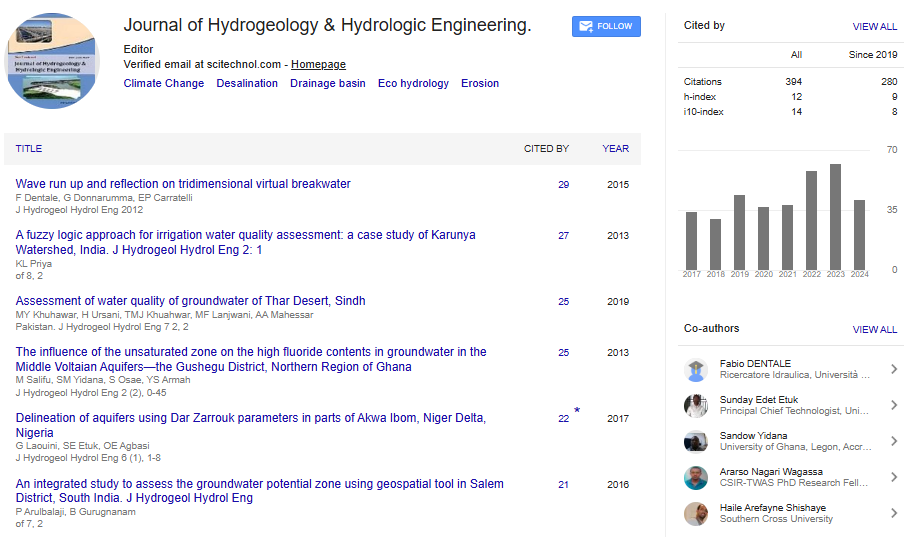Opinion Article, J Hydrogeol Hydrol Eng Vol: 12 Issue: 1
The Importance of Surface Water
Hussain Minhas*
Department of Environmental Psychology, University of East Anglia, Norwich, UK
*Corresponding Author: Hussain Minhas
Department of Environmental
Psychology, University of East Anglia, Norwich, UK
E-mail: minhash85@gmail.com
Received date: 25 January, 2023, Manuscript No. JHHE-23-90703;
Editor assigned date: 27 January, 2023, PreQC No. JHHE-23-90703 (PQ);
Reviewed date: 10 February, 2023, QC No. JHHE-23-90703;
Revised date: 17 February, 2023, Manuscript No. JHHE-23-90703 (R);
Published date: 24 February, 2023, DOI: 10. 4172/2325-9647.1000251
Citation: Minhas H (2023) The Importance of Surface Water. J Hydrogeol Hydrol Eng. 12:1.
Description
Surface water is water located on top of land, forming terrestrial waterbodies, and may also be referred to as blue water, opposed to the seawater and waterbodies like the ocean. It is an essential resource that plays a significant role in sustaining life on our planet. It provides drinking water, supports agriculture, and is a critical component of our natural ecosystems. In this article, we will explore the importance of surface water, its characteristics, and some of the challenges it faces.
Characteristics of surface water
Surface water can be found in many forms, such as rivers, lakes, streams, and oceans. It is replenished through rainfall, snowmelt, and other sources of precipitation. The quality of surface water varies depending on its source, location, and the activities that take place in the surrounding areas.
One of the key characteristics of surface water is its movement. Unlike groundwater, which is stored in underground aquifers, surface water is constantly moving. It flows downhill, following the contours of the land, and is affected by various factors such as gravity, temperature, and atmospheric pressure.
Another important characteristic of surface water is its temperature. Surface water temperatures can vary widely depending on the location and time of year. For example, a shallow stream in a sunny location may have higher water temperatures than a deep lake in a shaded area.
Importance of surface water
Surface water is a crucial resource that provides a range of benefits to human and natural systems. Some of the key benefits of surface water include:
Drinking water: Surface water is a vital source of drinking water for millions of people around the world. It is treated and distributed to households, businesses, and other institutions.
Irrigation: Surface water is used extensively for irrigation, particularly in agriculture. Irrigation helps to increase crop yields, support food security, and promote economic development.
Industrial use: Surface water is used in many industrial processes, such as cooling and manufacturing. It is also an essential component of hydroelectric power generation.
Recreation: Surface water provides opportunities for recreational activities such as swimming, boating, and fishing. These activities have significant social and economic benefits.
Ecosystem Services: Surface water supports a range of ecosystems, including wetlands, rivers, and lakes. These ecosystems provide valuable services such as water filtration, nutrient cycling, and habitat for wildlife.
Challenges facing surface water
Despite its importance, surface water faces numerous challenges, including:
Pollution: Surface water is vulnerable to pollution from a range of sources, including agricultural runoff, sewage discharges, and industrial effluents. Pollution can cause water quality to deteriorate, leading to health risks for humans and wildlife.
Climate change: Climate change is altering surface water patterns, leading to more extreme weather events such as floods and droughts. These events can have significant impacts on water availability, quality, and ecosystem services.
Overuse: Surface water is often overused, particularly in areas with high population densities and limited water resources. Overuse can lead to depletion of water sources, affecting water quality and ecosystem services.
Invasive species: Invasive species can displace native species, altering the composition and function of aquatic ecosystems. They can also cause significant economic damage, particularly in industries such as fishing and aquaculture.
Conclusion
Surface water is an essential resource that plays a critical role in sustaining life on our planet. It provides a range of benefits to human and natural systems, including drinking water, irrigation, and ecosystem services. However, it faces numerous challenges, including pollution, climate change, overuse, and invasive species. To ensure that surface water remains a sustainable resource, it is essential to manage it responsibly, protect it from pollution and overuse, and adapt to the impacts of climate change.
 Spanish
Spanish  Chinese
Chinese  Russian
Russian  German
German  French
French  Japanese
Japanese  Portuguese
Portuguese  Hindi
Hindi 
